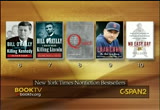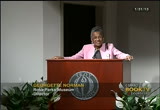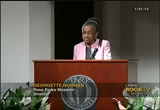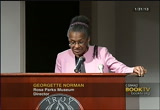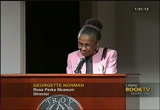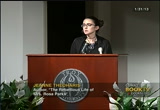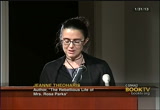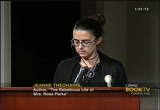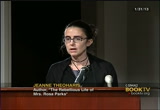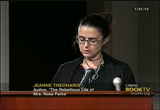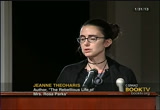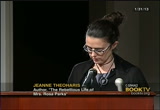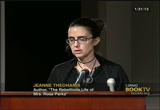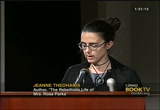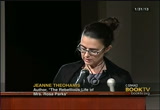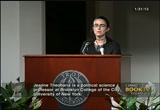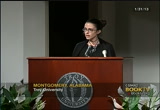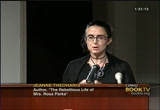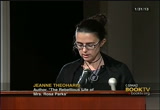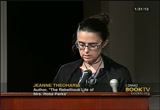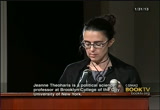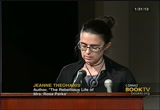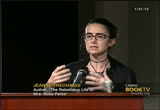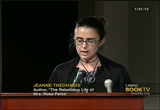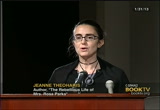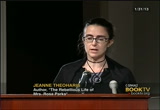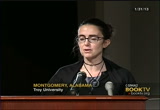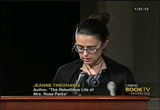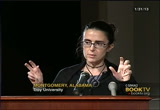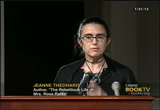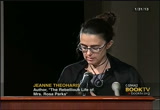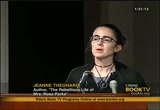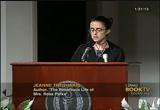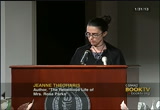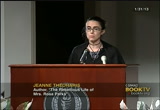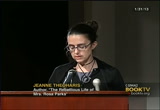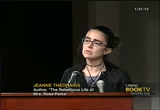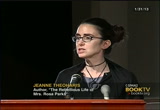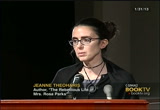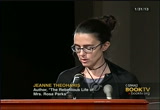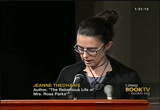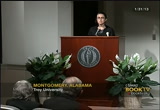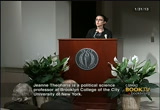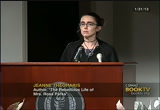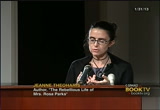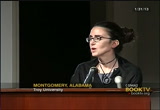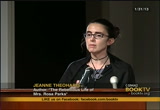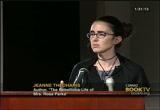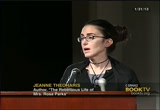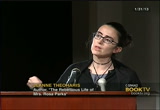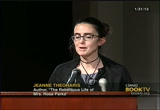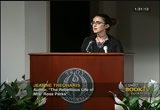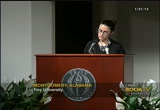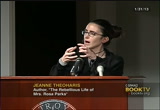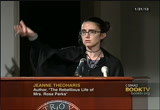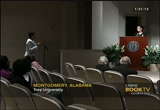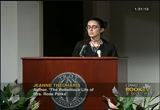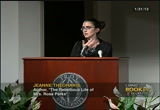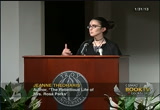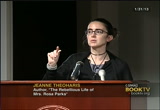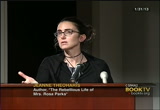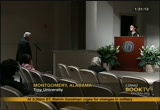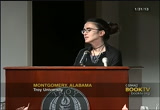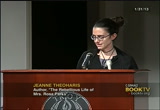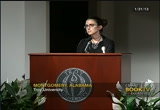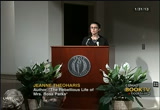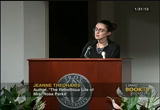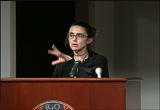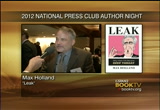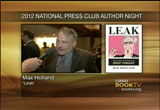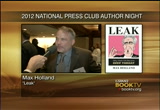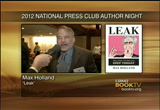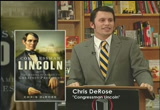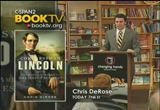tv Book TV CSPAN February 23, 2013 1:00pm-2:15pm EST
1:00 pm
number 10 is mark owens no easy day. for more on these bestsellers, go to "new york times".com. >> jeanne theoharis recounts the life of rosa parks. she is most remembered for her bus arrest in montgomery, alabama. her involvement was far more extensive. this is about an hour and five minutes. >> good evening. on behalf of the chancellor and faculty, i welcome you to our campus.
1:01 pm
1:02 pm
what is the price paid for having done something? dr. jeanne theoharis answers some of those questions and she writes it in her new book "the rebellious life of mrs. rosa parks". jeanne theoharis was born in staten island six weeks ago and her family moved to milwaukee, wisconsin, where she was raised. she held the first chair in woman's studies and as professor of science at boca raton college, she is also co-founder of educators for civil liberty. she is the author of numerous
1:03 pm
books on the civil-rights movement and the politics of race in the united states including as co-author of schools suck:students talk back to the segregated nation and its failures of segregated schools. jeanne theoharis received her ab in afro-american studies from harvard college and ph.d. in american culture from the university of michigan. she is author or co-author of six books and numerous articles on the struggle of politics of race in the united states. turned latest put you hear about tonight from which she will be reading represents a correction to the popular iconography of rosa parks as a quiet seamstress with one single act that sparked the modern civil rights movement. she reveals a civil rights movement radical who fought to expose and eradicate the
1:04 pm
american racial caste system in jobs, schools, public services. help me welcome dr. jeanne theoharis. [applause] >> i am so delighted to be here. my book came out last week and it wouldn't have been possible without the help and support and vision of many many people including many people here in montgomery the talk to me, pointed me for its materials and archives. and people in detroit who did the same thing who are committed to telling a bigger, broader story not just of one day of rosa parks of a life of being rebellious as she would put it
1:05 pm
so i am grateful to be here tonight and tremendously grateful to georgette norman and the grassroots and many people i interviewed for the book in montgomery and the fourth, certainly this book is far better for that. it is one of the most well-known american stories even among elementary school lawyers. on the evening of december 1st, 1965, rose up parks took the bus home after work. when the front of the bus filled and one white man was left standing the bus driver asked her to move. parks refused. the bus driver had her arrested. per arrest galvanize the black community in a yearlong boycott of montgomery bus is ensued. this catapulted a young martin luther king jr. into national leadership and a shared in the modern civil rights movement. one year later, on an order from the supreme court, montgomerie's buses were desegregated.
1:06 pm
despite parks's center placement in the story and subsequent more realization of the civil rights movement we rarely see the story and surrounding history from her perspective. hidden in plain sight she is the symbol but rarely the story. parks has been awarded the nation's highest honor, congressional gold medal, presidential medal of freedom, the first woman and suffering 7-second african-american ever to lie in honor at the nation's capital. next monday, february 4th on the centennial of her birth the post office will issue a stamp in her honor but despite these honors her legacy is too often reduced to a simple act by a quiet seamstress' on a single day. that fable of rosa parks shows how far we have come to put the history of the civil-rights movement firmly in the past. her quietness is celebrated over and over and over again.
1:07 pm
particularly because we are in this historic space where she made this stand, it seems fitting to return to that founding moment and broader history and report on it anyhow. seeing events from her perspective changes and deep and how we understand the civil-rights movement in four substantial ways. first it gives us a much longer history, more than a decade of the political work that parks and a cadre of activists did to till the soil for a movement in montgomery. second, it shows the courageous, how courageous in fact her bus ban was, and many people including many women played in the black struggle and the sacrifice and suffering it produced for parks and her family. it shows the bread of the civil rights movement has the park's
1:08 pm
family are forced to leave montgomerie and she spends more than half of her political life in detroit challenging the racism of the jim crow no.. finally it provides lessons, i think, for us today, what it takes to make change in a moment and over the course of a lifetime and what her legacy asks of us now. who was rosa parks before the boycott? she had a life history of being rebellious as she put it. she was raised by her mother and grandparents who taught her to stand up for herself. grandfather was a follower of martha starving. there was no education provided black children past 6 grade so great sacrifice her mother sent her to midwife school for girls in montgomery. roselle was reserved girl. a bit of a goody 2 shoes her friends 5, who followed this will's prohibitions against dancing, movies, makeup and
1:09 pm
short hair. but she had a feisty side. when she and her brother were threatened by a white boule, she picked up a brick and threatened to hit him. he ducked. when a young boy pushed her in front of his mother she pushed back. when the mother threatened to kill her, she said he pushed me and i didn't want him pushing me. parks fell in love with raymond parks in 1931, the first real activist i ever met, she said. when they married raymond parks was working to free the nine scottsboro boys, yawing been denying young men ages 12 to 19 who were caught writing a rail and the trains as many people did during the great depression. two young women were found on that train and it charged -- charge and sentenced to death. raiment and a group of local people sort of became the
1:10 pm
groundwork to defend the scottsboro boys and rose a joint raymond in this very dangerous organizing. the meetings were secret. she recalls one late-night meeting at her house with guns covering the table and later reflected that she was so scared she forgot to offer any refreshments. in 1943 she saw picture of john carr, classmate in a photo of the local naacp. realizing the organization was open to women she decided to attend her first meeting. the only woman there that day, she was selected secretary. she wanted to register to vote. e. nixon, an activist in the union across borders was heading up this effort. there were only 31 black people in montgomerie at that time registered to vote. nixon came by her apartment to
1:11 pm
bring her some materials and so began a partnership that would change the course of american history. she tried three times to vote. part of the process was a test, but that test was administered differently for black people than white people. on the third time she took it, sure that she had passed and the siting she would consider bringing suit if she didn't pass, she copied down all the questions and the answers. the registrar saw her. she passed the test. a final hurdle was that once you were registered people were required to pay poll taxes, not just from the year they got registered but from all the years back to when they had been ostensibly eligible to vote. $1.50 for each year. for rosa parks that was $18 which was an extraordinary amount of money. e.d. nixon and rosa parks wanted
1:12 pm
to transform the naacp into a more activist branch so in 1945 nixon run for president and wins. parks again is elected secretary. many middle-class members of the branch wanted more of a social club and opposed these politics and wrote to the national naacp office. these letters are at the library of congress. they are mad and don't like him and they think he is a dictator and his politicking and they try to unseat that and they try to get the national office to come in. both parts of nixon were working class, we worked in a working-class west side, she is in the cleveland court project with her husband and her mother moved their. nixon and parks are reelected to head the montgomerie branch and they come to head the alabama conference of the naacp. a lot of what they did in the late 40s was tried to document
1:13 pm
white brutality against black people, file affidavits, and also sort of protest and challenge legal lynching. the prosecuting of black men for sexual crimes who had either stepped out of place or were having consensual relationships with white women and so these charges sort of were used to put people back in their place. rosa parks traveled the state taking testimony, trying to get people to sort of be willing to sign affidavits to send to the justice department that they would send to the national office, they would send to the justice department. this work was incredibly dangerous. most people were very scared and refused to sign affidavits, much to the dismay and frustration of raymond parks. when we hear the term naacp today it sounds somewhat mild but this work was anything but
1:14 pm
mild and only a few were courageous enough to do it. in the mid 40s rosa parks attended naacp leadership training workshop organized by ella baker. she found her tremendously inspiring, she becomes a mentor for rosa parks and often will stay with rosa parks when she comes to alabama, to montgomery. over and over this small group of activists are sort of tried to demonstrate their opposition, but most of these cases go go nowhere and she is increasingly discouraged. shea reforms the youth chapter of the branch and takes pleasure working trying to get the young people to take forceful stands against segregation including a sit in at the main library because the main library wasn't open to black patrons. black people had to go to the college branch to get books so she and the young people started
1:15 pm
to do read ins and try to get the main branch to serve them. on the suggestion of white civil-rights supporter, va. dear who processed selling at night, rosa parks attend the two week workshop at highlander school on school desegregation. hymen there was an adult training school and tennessee and by the 1950s turned attention to civil-rights and it had always been an interracial space but by the 50s and particularly in the wake of the brown decision and the supreme court's unwillingness to put any timetable on school see dead -- desegregation, classic language, all deliberate speed, supreme court backs off the implementation so activists like myles horton who ran, they seek they will do this themselves. for two weeks in 1955 rose a
1:16 pm
parks goes to tennessee and joins with 48 other people to develop a plan for the implementation of school desegregation. this is tremendously good for her spirit. the first time she feels she could speak and eat and eat with white people without hostility. she liked waking up in the morning and having white people make her breakfast. the one who ran many workshops, she is a teacher who had been fired because she refused to give up her membership in the naacp. another huge inspiration and mentor for rosa parks that parks really admired how calm she is when she feels so nervous and so sort of worn down. on the last day they do like many organizing training workshops, they delay go around and everyone is supposed to say what they're going to do when they go back and rosa parks says nothing is ever going to happen
1:17 pm
in montgomery. white resistance is too enormous and the community isn't unified and won't stick together so i am going to work with young people. the idea that rosa parks one day up and did what she did, the courage, the fortitude, the frustration that laid the groundwork for action. so the bus. various misconception i think most of you know. she was not sitting in the white section. she was not particularly tired that they. she was not a plant. her act required tremendous courage in part because she and many other people in were made stand on the bus against segregation and could go nowhere. the bus driver carried a gun. her act was not the first or the third, in the number of black people in the decade since world war ii had made stands on the bus. her neighborhood near bob brooks in 1950 had been killed by
1:18 pm
police for his stand on the bus. 15-year-old claudette coleman was arrested in march and manhandled by police, his arrest stunned montgomery's black community and raise money for her case but no mass movement had emerged. on that december evening she got off of work deciding to wait for a bus she goes to the drugstore to get several things. at 5:30 she boards the bus taking a seat in the middle section. at the third stop the bus fills up and one white man is left standing. by the terms of segregation at that time four people are going to have to get up for the one white man. the driver tells the four black people in the middle road to move. three reluctantly according to parks get up but pushed as far as she could be pushed she decides to stand fast. man sitting next to her to get out and sliding over to the
1:19 pm
window. people always say i did, my seat because i was tired but that isn't true. i was not tired physically, no more tired than i usually was at the end of working day. the only tired i was was tired of giving in. she did not believe that any movement necessarily went into her act. there is no evidence of any plan or indication till the moment presented itself that rosa parks knew she could summon the courage to refuse to move her seat. it is likely that she like many particularly after the arrest talked about what they would do if she was asked to give up her seat to a white person. thinking or even talking about it and actually being able to act in a moment are vastly different as most of us know. what makes her different is in that moment she seized the opportunity and summoned the will to stand fast. and sure she would get off of the bus a live she described it
1:20 pm
one of the worst days of her life. in interviews later she admits to wishing other people had joined her and described her stand in less than triumphal terms which i felt resigned to give what i could to protest against the way i was being treated but she also contextualized her decision with in her role as a political organizer. an opportunity was being given to me to do what i had asked of others. seeing herself part of a fledgling movement she thought she had a responsibility to act on behalf of the larger community. she had been pushing the young people in youth counsel and had grown disappointed in the way is that adults in the community had fulfilled young people. her decision as much as frustration from lack of change and a belief that her particular action would offer anything. i simply did it because i thought no one else would do anything. back to the bus. blake gets off of the bus and
1:21 pm
call the supervisor who tells him to put her off of the bus. that is what the supervisors said. people are grumbling on the bus. he can't hear them but they are grumbling. blake then called the police and the police come and could have just evicted her from the bus and she believes that is what the police wanted to do. e over here them saying something but blake insists that he wants her arrested and agrees to come down to find the paper work. she also number of interviews talk about finding her arrest irritating and annoying. i love these words because i think it -- at the time she sees this as the detour from the work she's doing, she is planning at workshop that weekend and now she has gotten herself arrested and she doesn't see this as the moment where is all going to obama. pcs i have been arrested. she calls home, meanwhile somebody on the bus goes to tell
1:22 pm
nixon and so nixon and her husband come down to bail her out a few hours later. they go back to parks's apartment and nixon is delighted because this is the cascade she has been looking for. raymond is worried for her safety but also that the community won't stay together and back her in the long run as had happened in the coleman case but after some discussion she decides to go forward, she calls fred gray to ask him, and new, young black lawyer in town that she has been mentoring, meeting with. she calls him that night and gray then calls joanne robinson who is head of the women's political counsel when the women's political counsel that decides to act and called for a one day boycott on the mundane when parks is to be arraigned in court.
1:23 pm
in the middle of the night robinson with two students sneaks into alabama state where she is a professor and runs off 30,000 leaflets. at 3:00 a.m. robinson calls nixon. robinson doesn't call parks interestingly. she calls nixon and at 5:00 in the morning nixon starts making calls to ministers in town because she sees the need for the ministers to be on court so he calls reverend abernathy and a young minister in town by the name of rev. martin luther king who is new in town and whose church is centrally located and nixon sees this as an ideal place to have this meeting. it is not until the next day at lunch that rosa parks finds out about these plans when she goes like she usually does, she often would take off from her job in montgomery fair to have lunch at the office and she gets there
1:24 pm
that day, sort of find out about the plan. meanwhile, that saturday, she scheduled a news workshop and only a couple kids come and she is really disappointed and increasingly nervous. she planned this whole thing and nobody comes and they're planning to boycott her and she is -- the first day of the boycott is amazing and she very much describes her best memory from that whole year being waking up that morning and seeing the buses empty. she goes to the courts and after court goes back to fred gray's office to help out and this evidences for core political spirit. she doesn't go back to work that day, she doesn't go home. it has been a big day, she goes back because all these people calling the office, she answers the phone but she doesn't tell
1:25 pm
people it is her. she answered the phone telling people what they need to know but does not say this is rosa parks. and then meanwhile, that afternoon, gray goes to a meeting, actually the meeting that will burst the montgomery improvement association and so rosa parks is back in the office answering phones, this is the beginning of the montgomery improvement association, the seeds of it. and that night, 15,000 people packed the baptist church and surrounding streets, thousands of people don't get in. virginia there does not get in, rosa parks has to fight her way into the church and she is on the dais that day and given the tremendous standing ovation, but does not speak. i recall asking someone if i should say something she later
1:26 pm
recalled. and someone saying you have said enough. in a later interview with miles horton she noted that she just sat up there. everyone spoke about me, she said. it didn't bother me at that point. the boycott itself lasted 382 days, maintained by tremendous unity, fund-raising and twice weekly map meetings, and amazingly elaborate festival that was set up with 40 pickup stations around the city where they charged the regular bus fare and made it possible for people to go to work, go to church, go to doctors, go shopping and other errands. people would use the the 4 victory sign to identify themselves. it tends to break the legion, people were often felt it with food, stones, urine and other things, please continue the pulling over car pool on real and imaginary violations. the white citizens council
1:27 pm
membership explodes, 14,000 members in the first three month of the boycott, mayor and police commissioner join and in february using an old law on the books they indict 89 boycott leaders. but instead of weakening the organization this threatens the resolve. rosa parks spends much of that year fund-raising crisscrossing the country raising money for the montgomerie of improvement association for the naacp. even though her own family is in serious financial trouble she loses her job a month in to the boycott, she is working at montgomery fair and her husband is a barber at the nassau air force base and they say they forbid any talk of the boycott for that woman and for a broad political man like reverend parks that is an untenable situation and so -- they are in
1:28 pm
serious economic trouble so she is getting a lot of that year across the country raising money to make this kind of amazing organization possible and also turning the local movement in many ways into a national struggle. what happens afterwards? even though the boycott ends shea and raymond still find it impossible to find any steady work. they are still receiving constant death threats. her and nixon wants to start an independent voter registration throughout alabama and the idea that she would run it full time and be based at fred graham law office and try to fund raise for this, meanwhile this sort of dissension and controversy kind of the erupts behind closed
1:29 pm
doors in the montgomery improvement organization and a paid political position for rosa parks. nixon and parks are on the upside so she has not offered work. eight months later unable to find a job, dispirited by the situation, facing death threats, they decide to leave and moved to detroit. and the promised land that wasn't. she still struggled, they struggled to find work, they live as she describes it in the ghetto, health problems continue. she developed all sorts of things during the boycott that continue to plague her and land her in a hospital in 1960 but they can't afford the bill said they going to collections. this suffering starts to get exposed in the black press, a cover story in 1960 on bus
1:30 pm
boycotts, for got women and that begins to sound the alarm and raise attention to her situation and those beat to help for the park'ses. in the midst of these difficulties she spent the second half of her life in detours challenging racial discrimination of the jim crow no. housing, schools, jobs, police brutality. her description of detroit as the northern part land wasn't is a powerful reminder that racial inequality was a national plague, not a southern malady. and they were thankfully gone, rosa parks did not find too much difference between raise relations in montgomery ward before each. in 1964 she volunteered for political campaign by a young upstart civil-rights lawyer named john conyers who's running on a platform of jobs, peace and
1:31 pm
justice and conyers and rosa parks are early opponents of the war in vietnam. she starts volunteering the campaign and actually persuades martin luther king who is not doing any political endorsement, prevailed on him to come to detroit to make an appearance for john conyers. this is an extremely crowded time with eight people running and conyers wins the primary by less than 100 votes, 40 votes and attributes part of why he wins to rosa parks prevailing on king to come. one of the first things conure does is tires rose up parks to working his the foreign office handling constituent needs and doing community outreach particularly around issues like jobs, housing, welfare and particularly in the first year, really part of his community presence on the ground. by later years she works in 1988 certainly by the 80s her role is
1:32 pm
more ceremonial but in those first years she is our key presence and a key legitimizing force for conyers and conyers gets a lot of flak for hiring rosa parks. the office receives all sorts of hate calls and death threats and she receives all sorts of hate letters. unless she is undeterred. in the 60s and 70s continues her work amid the growing black power movement. rosa parks's personal hero was malcolm x and she got to meet and hear him three times. the first time was in 1963 when he came to detroit to give the famous message to the grassroots and actually wanted to meet her and make it known to mutual friends and that is the first time they meet. last time they meet is the speech he gives is often
1:33 pm
referred to as the last message, delete before he is assassinated and actually program being driven and she is being honored by that program so they get to have a long personal discussion that day. by the 60s and 70s term commitment which include she is a long standing lifelong believer in self defense, she have long believed there needed to be more black history in the curriculum and the criminal justice system, she has long fought for independent black political power and economic justice. these longstanding political commitments intersect with the emerging black power movement and she does what she can to support and take part in that. parks had a, quote, heavy progressive street about her
1:34 pm
that was an characteristic. part of what she did in the black power unit was show up, spoke with her presence. black nationalist bookstore owner and bonds says that rosa parks was everywhere. attended rallies and speeches and meetings and signed petitions and came from doctors and immersed herself in all the black history she could get, protested police brutality, spoke out on behalf of black prisoners and helps commence defense committees, she did not want to join groups anymore or give speeches but she sought to use her stature to get attention for the cause and came out for things and let groups use her name. 1967 detroit riots began a mile from her house. she was saddened by the events the very contextualized by what was happening in resistance to change the civil rights resistance the man that accrued
1:35 pm
over the decade. she could understand the uprising as she says as the result of resistance to change that was needed long before and. that is her quote. she's always the establishment of white people were antagonized and provoked when young people want to present themselves as human beings and coming to their own as men there is always something to cut them down. she always wanted to contextualize those actions in a larger history and larger white resistance. she takes part in the people's tribunal in detroit. the people's tribunal part of what happens is in conyers words becomes a police riot, tremendous police repression and violence, the most egregious is three young men are killed and no accountability, the police are not indicted.
1:36 pm
even the media are not willing to pursue any stories about it so they hold people's tribunal and rosa parks serves on the jury for that and she is part of the local rebuilding effort and helps the part of the virginia district council which builds the first black own the non-profit center in the country and that breaks down in 1981. she helps run the flight -- and comes down to the county to support the movement there and in 1966 when deadly carmichael comes to detroit to give one of his famous black power speeches one of the first things he does from the pulpit is called out and say mrs. parks is my hero. she had just been willing to stand with them in miles county. rosa parks helped take the poor people's movement forward after
1:37 pm
martin luther king was assassinated and goes to d.c. and speaks of fallen -- solidarity and attend the black power convention in philadelphia. she is part of a group of black people in chicago democratic convention in 1968 that refused to endorse any candidate. attends the national black political convention at barry in 1972, she works on the defense committee for joanne little, gary tyler, angela davis, she is a longstanding opponent of the death penalty, she is an early and vociferous involvement of u.s. activity in vietnam, takes part in the genet rankin brigade and helps the soldier hearings, she opposes apartheid and in the 1980s will join tickets outside the south african embassy against apartheid and u.s. complicity in helping to prop up the south african government and eight days after 9/11 she joins
1:38 pm
with a number of civil-rights activists to call for justice, not vengeance, decry any move to war and insist the united states work with international law and the international community to bring justice. where do we go from here. the anniversary of the boycott last month president obama tweeted a picture of himself on the rose of parks bus in the classic rosa parks close. next week the post office will issue a stamp. she is as one of my colleagues put it the american version of a national saint but her legacy asks much more of us that a stamp raise statue and if we are going to claim her legacy as president obama did last month then we must realize what it asks of us? rosa parks's courage was the ability to make an independent stance even though she and others had done it before and
1:39 pm
nothing had changed and even when she well understood the harm that might be called her and to make those stands over and over throughout the course of her life. even when the civil-rights movement gained 7 victories she did not arrest but continued on, joining with old and new comrades to press the struggle for red not worried what others would think of those alliancess. honoring her legacy means summoning a similar courage. it requires acknowledging america is not opposed racial society and racial and social injustice is deep and manifest. it entails a profound commitment to the goals she spent a lifetime fighting for, criminal justice system fair and just for people of color. unfettered voting rights, educational access and equity, real assistance to the fore and end to u.s. wars of occupation and black history and all parts
1:40 pm
of the curriculum. it means heating words to some college students, don't give up and don't ever say the movement said. thank you. [applause] [inaudible] [inaudible] >> i think i come from a number of different places. i come as a scholar and historian but also as a political activist myself. my research around the starts after the funeral.
1:41 pm
as many of us were, stunned and mesmerized and dismayed by the national pageant made of her passing and the ways simultaneously was supposed to be honoring her but she seems to become this fuzzy, quiet, not angry as if -- about the bus and i did a talk that was about her funeral in the civil-rights movement. and put it in the past to make a narrow movement and colleague asked me to turn that talk into an essay for a book she was spending so i sit down, wanted a little more meat in terms of who rose up parts was and the way the more realization distorts this. and i start to look at realize how much of a story there was.
1:42 pm
the decade of research i did before was on the civil-rights movement in the north. and all of the work that she had done alongside emerging black power -- power movement. it grabbed me because the most iconic story with all these stories trying to sell for many years, it is so puzzling to me that there was not a scholarly biography. and what is the most surprising thing about rows of parked? why isn't there a biographer of her? she has gotten incredible national honors.
1:43 pm
everyone knows who she is and yet she hasn't gotten treatment as a serious political figure. we think of lyndon. his biographys number in the hundreds. many figures have serious treatment. it seemed to me rose up parks deserves serious treatment and simultaneously we were comfortable with this kind of children's book version of rosa parks. are also felt humbled by that. in some sense i assume there is a biography, i just can't remember what it is. so i think it was that process of seeing the sort of themes in her history and simultaneously feeling like what was it, this kind of needed? i am hoping this book just begin
1:44 pm
that process. there is so much more work to be done on her so i hope this is just the beginning. [inaudible] >> very good. thank you. [inaudible] >> how much anecdotal information did you get an individual like -- [inaudible] >> this is for the second half of this book. half of the book is basically takes place outside of
1:45 pm
montgomery. that required a number of things. i did dozens of interviews and a lot of those interviews were people in detroit. as you allude to when you look, an amazing number of interviews with rosa parks and the history of rosa parks and the lot are done in detroit and the sitting in john conyers's office and do they ask her what do you think of the war in vietnam? they do not. do they say what should the congressman be doing? they do not. in many ways this part was harder to find. a couple things helped with it. the first is the black press and the digitalization of the black press that happened in the past decade was extraordinary resources for my research because it meant i could look at decade's worth of many different black newspapers. even though people didn't stand to ask a lot about her political opinions about things outside of
1:46 pm
montgomery. they did mention when she would go to things. this in some sense was the place i started in terms of time to figure out how to tell -- tell the post montgomerie story. i talked to a lot of her friends and political colleagues in deflates and nationally to try to get to get a sort of more textured to this kind of what she is doing in the 60s, 70s and 80s and i can tell you some of my favorite stories, one of my favorite stories. do people know the lawyer who was in the rna, he was a lawyer for the scott sisters last year, they were two women, and long sentences, and drug charges, sort of older man, lawyer.
1:47 pm
he tells me two interesting stories. the first is the republic of new africa started in the flight and is the group that started around the issue, part of that group breaks off and comes down to set up the black nation. needless to say the fbi doesn't want this so there is the survey out and a whole kind of rate of the rna farm and there is a shooting and the shootout between the police and the rna and 11 members are arrested to and paraded through jackson half naked. one of the neighbors called back to detroit and said this is happening and one member of the rna called conyers's office to tell them what is set in and get
1:48 pm
conyers's office to intercede and protect some people don't get killed because there has been issued out, an officer had been shot. rosa parks gets on loan, the department of justice, she gets an assurance in that weird way, nobody will get hurt and they very much attribute her kind of quickness and getting on the phone to the department of justice saving their lives. the head of the rna says she would then call, in prison for the next five years on conspiracy charges and she repeatedly calls and says this is rosa parks calling and just to show them that she was walking, to me that speaks of her firmness and disability to
1:49 pm
view things, she attended -- edward bond wrote a book store in detroit and talks about her like she -- would go into the bookstore all-time and there were all these discussion groups and activist groups that came out of the bookstore and she would attend many of their forums. he was saying i would go to things and i would be like that is rosa again and she would be everywhere and she was sort of again undaunted and not worry what people were going to think if she showed up to listen to some radical speaker, she went where she wanted to go. one of the people who worked with her said she drove a huge car, really big white some sort
1:50 pm
of american car, pretty small, drive in her big car at all these events and the image and juxtaposition that she was going in her big car. let me stop there. there are many stories in the book through these interviews and in part i was able to do things like find something, a little mention of something but that would often be enough to trigger people's memories or vice versa. how i found out about the lawrence county stuff was i did an interview with dorothy do they and she said we went down to the lounge and one of the big mass meetings a year into the campaign their it is listed that she gives the opening. so it makes sense when carmichael comes to detroit a
1:51 pm
couple months later in michigan carnival which is the black newspaper, she is sitting in the front row, he calls out to her so it helps me peace these little strands together so this tries to show these little threads into a bigger tapestry. i hope i started it and i hope other people will go even farther than i could. [inaudible] >> i think we think we know her. and we think and because we
1:52 pm
think we know her, sort of new incredibly kind of vibrant scholarship over the last ten or 15 years, young scholar is doing great work. you just assume it has been done and i think i assumed it too. somebody else had done it or that we sort of knew what she was so we needed to look at other stories and unearthed other activists. i think it a little bit speaks to what i tried to talk a little bit at the beginning which is this kind of paradox of the way she is honored, but kind of that she is honored but just in a very small way. kind of she is relegated to
1:53 pm
being a symbol and symbols don't have to have a whole history. that is related to her being a woman. there is the gender aspect of this too. in terms of how we imagine what her story is or is not and the questions we ask so just to tell you another story about this, i am on the trail of the lawrence county story, very kind of one of his specialties and trying to get him, sort of says she did something, we would know about it. i know she -- i have the documents, i am trying to figure out the bigger story that there is a sense that because she is so famous, if she did other things we would know it. it might be the opposite. because she is famous, it obscures the other things, much broader history and broader
1:55 pm
[inaudible] [inaudible] >> no. what people did in terms this -- what people did in terms of her passing on the ground and those people standing in line, people standing outside during her funeral, many people across the country did memorials for her and in the book i'm trying to draw a distinction to the national uses of her funeral and the ways that people -- we will
1:56 pm
see this on monday with the centennial. there are many people who will be making real meaning and talking about the legacy. the other way the centennial is going to be used is to put the movement in the past. a very feel good about ourselves how great we are, honoring rosa parks and that is the danger, this is not just about rosa parks. there are uses of the civil rights movement and ways that are very narrow history of the civil-rights movement like martin luther king and she's very disappointed, she campaigned hard for us king holiday and then sees a train to a funny dream eking it now is that the substance of the act as she knew sort of gets lost in the holiday and i imagine she
1:57 pm
might have the same critique in terms of some of the ways she is honored and the way of the substance of -- in terms of the labor stuff there's another story. during the boycott local 600 wants to bring rosa parks to detroit because the local 600 is a real kind of militant local -- it had been purged of its communists and was very much seen as a trouble making local and walter opposed local 600 wanting to bring rosa parks to detroit, but they raise the money and bring her anyway and it is interesting so seven years later, it the front of the march on washington he seems like this sort of real civil-rights
1:58 pm
scholar but there is a sort of, you wasn't always there so they bring her and they bring her to detroit. most of the hotels in the fleet are not open to black people. they put her up at the garfield hotel and she makes a number of connections at that meeting that she is going to draw on personally and politically when they moved back, not to move back, move their. she has a longstanding relationship with black labor and interestingly it is the deep flight naacp is a very big but in some instances in those years very middle-class and not very activist branch and when she first moved there there is a little naacp chapter in river ruche and that is a bedroom community detroit but also full
1:59 pm
of autoworkers and local 600 autoworkers in particular and it is that bill naacp group that actually gets the national naacp to help rosa parks. those sorts of militant and that river rouge chapters interesting. they cut a very different paths. they are doing all sorts of boycotts of banks because they are not hiring black and after patrice is assassinated as a resolution calling on the national naacp to come against his assassination and the national naacp doesn't go for that too much so this little river rouge chapter kind of makes the national naacp activists, talking about this river rouge chapter that send the naacp to help her and sort of step in so she sort of she
2:00 pm
2:02 pm
[inaudible question] and. [inaudible question] [inaudible question] >> right. he told me this funny story. apparently at some point in the midst of this becomes a net wants to have the wage reduction salary. suez going to much traveling so much in doing so much public appearances. worried that he was going to feel like she was home, you know, kind of taking advantage or not living up to her responsibilities. she told me. of course, what you doing those things. have things to him it was just so horrifying that there was rosa parks and you should reduce my salary. all these public appearances. yeah. [inaudible question]
2:04 pm
[inaudible question] >> thank you. often when i am teaching that, that moment she is like a million no, nothing is ever going to happen and people aren't going to stay unified. does the feeling that people have today. my students often wish they, you know, looked back on those years and said, welcome back in the day people were so much more unified. i wish i lived back in that day. but people today are unified
2:05 pm
these the same years that these people we are studying grab it to doug trumbull was -- studying grappled with. it is scary. it doesn't, you know -- and the kind of worry as we think about the weekend before the first day of the boycott, how worried people were. the worries we have other worries that they had so i think also, humanizing the history so that you can see how to make the kinds of choices. i think by humanizing it also makes it -- you can see how people make choices. as the story goes. that morning. six in the morning. and king says, well, can you
2:06 pm
call me back. i am brand new here. a one month old baby. 6:00 a.m. can you call me back? he does not know. he's just martin luther king. he obviously has to five you know, he has the conviction, but its 6:00 a.m. monday as a new baby. mixing cause them back. i think this kind of detail also, i think, makes it easier to imagine how we do it ourselves, and i think that is the other reason for more detailed looks at her and her life among other civil-rights histories. i think it gives us a different way forward. >> you're watching book tv on it
2:07 pm
c-span2, 48 hours of nonfiction authors and books every weekend. >> editor of the website washington decoded and the author of a book, why park became to deep throat. >> it was completely for internal bureaucratic reasons. he wanted to destroy pat gray who was the interim fbi director after hoover. it had nothing to do with principal, nothing to do with protecting the fbi for nixon. nixon was his ticket to becoming director. so he leaked in order to destroy it -- destroyed reagan made nixon think lower felt. so the idea that he was a whistle-blower or lead to destroy richard nixon is completely untrue. >> he was accompanied by? >> i'm sorry? >> he was accompanied by. >> the bureau was everything to rent. being the director of the bureau
2:08 pm
was a lot -- once-in-a-lifetime opportunity. he did everything in his power, engaging in dirty tricks, you know, fbi tactics to get to the directorship. i'll think word understood what was going on. >> you feel like he was misrepresented? >> absolutely. it's a fairy tale. >> following the death of mark felt probably put a boat. discussing his relationship. what are your thoughts? >> it's called the secret man commanded for the fairy tale. and i think what word is not obtuse. he has to know better, but he is sort of writing the tiger. he created this meant that he can get off.
2:09 pm
>> what are your sources? >> investigated and for leaking at the time. very revealing. people who were in the fbi, it's an untruth that the fbi's investigation was stymied and felt that the leaks, the details in order to press the forward. there was nothing in the washington post that the fbi didn't know. sometimes days, weeks, months before it appeared. >> unpremeditated do you believe this was in regards to his liking? >> completely premeditated. in fact, one of the things i discovered is the lead to a time magazine reporter named sandy smith more than he ever lead to woodward. woodward, you have to remember, was a cub reporter, almost wet behind the years. he did not know if he could trust him, and it turns out he couldn't because he betrayed the big secret of his existence.
2:10 pm
>> if he felt that he could not trust him, why continue the relationship? >> it ended an 73. and so was very upset. that was one of the things that will work is honest about, how upset he was with all the president's men. he stopped talking to would work . >> and in regard to today, we look at -- you're looking at the current administration. is there a mark felt? is there still a chance he can exist at there? >> absolutely. one of the things i think is important about my book is it shows the complicated relationship between sources in washington reporters. the true blue was a lower who acts completely a principle is a very rare bird.
2:11 pm
a fairy tale of the media is making. >> the author of the book leak, while mark felt became deep throat. they give. >> thank-you. >> here's a look as some of the upcoming book fares and festivals at around the country. during the second weekend in march book tv will be live from the tucson festival books and arizona. among several others featured are timothy egan and kristin iverson. be sure to check out our website, booktv.org, for updates on the schedule. virginia festival of the book begins wednesday, march 20th and runs through sunday, the 24th. this annual charlottesville virginia event features several authors, including douglas brinkley, the lab hours of, and congressman john lewis.
2:12 pm
2:13 pm
but he's trying very hard to get this job, commissioner of the general land office and the fails. it's a good thing he fails. washington d.c. as a bureaucrat. he is not in illinois found in the republican party. is that moving to the forefront of the party. the problem never becomes president. as we all know history of something better in store. he ends up losing washington. one-term congressman, future very much in doubt headed back toward the state of illinois, almost as and nothing happened. >> congressman abraham lincoln arrived in washington in 1947, the reasons for his quick departure. today at 7:00 p.m. eastern part of book tv this weekend on c-span2.
2:14 pm
>> here are some of the latest headlines around in the publishing industry this past week. a class-action lawsuit has been filed by three independent booksellers against amazon and six of the publishers. simon and schuster, random house, have shut, macmillan, and harpercollins. the bookseller filing the suit fiction addiction. but house claims that amazon and the major publishers have found confidential agreements to monopolize print an e-book sales. this it will concentrate on digital rights management with independent bookstores urging the court to prohibit amazon from selling e-books that are limited to only certain devices replications. the suit was filed in u.s. district court for the southern district of new york. and the finalists have been announced for the 303rd los angeles times book prizes. broken into ten categories, including a biography, current interest, fixing
156 Views
IN COLLECTIONS
CSPAN2 Television Archive
Television Archive  Television Archive News Search Service
Television Archive News Search Service 
Uploaded by TV Archive on

 Live Music Archive
Live Music Archive Librivox Free Audio
Librivox Free Audio Metropolitan Museum
Metropolitan Museum Cleveland Museum of Art
Cleveland Museum of Art Internet Arcade
Internet Arcade Console Living Room
Console Living Room Books to Borrow
Books to Borrow Open Library
Open Library TV News
TV News Understanding 9/11
Understanding 9/11